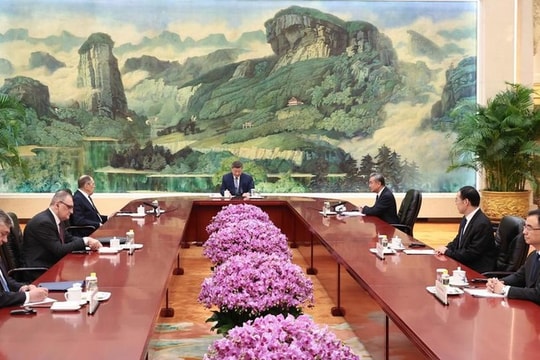Car-bicycle war in China's megacities
Environmental pollution problems have prompted the Chinese government to seek a return to the era of cycling.
 |
Cyclists weave between cars on the streets of Beijing. Photo: AFP |
Every morning, before the fog has cleared, Sun Jian rides his bicycle to work, weaving through the streets of downtown Beijing that are jammed with cars and buses. “There are so many cars in Beijing, it’s like pouring water from a basin into a bowl,” said Sun Jian, 39, a Beijing native and founder of the city’s famous cycling club.
If he’s lucky, Sun only has to endure traffic jams and pollution on his bike ride to work. If he’s unlucky, he’ll also be hit by a car driver who suddenly opens his car door, or argues with a car owner who illegally parks in a bike space. Sun Jian’s 30-minute commute is representative of the battle between cars and bicycles in China’s megacities, the New York Times commented.
As China's urbanization and people's lives become more prosperous, many urban residents of this country have moved to live in suburban areas to avoid the impact of construction sites. This has caused the use of urban cars to increase rapidly, combined with the government's loosening management policies, gradually eliminating the habit of using bicycles to work that Chinese people have had for decades.
In megacities like Beijing, the battle is even more stark. Buses, cars, and electric bikes are all vying for bike space. According to city government figures, only 12 percent of people now cycle to work, down from 38 percent in 2000.
However, with air pollution and traffic congestion becoming more serious, Beijing authorities are concerned that more and more people are abandoning the habit of using bicycles and are looking for ways to change this trend. City traffic officials hope that by 2020, the proportion of people using bicycles to work can be raised to 18%.
This is part of the "Green Transport" plan that the Beijing government has pledged to promote, with the aim of improving air quality and traffic congestion. Air pollution has become particularly serious in recent years, causing the number of people suffering from lung diseases to increase rapidly.
After the founding of the People's Republic of China in 1949, bicycles became a part of the country's culture. Bicycles, sewing machines and clocks were once the three essential items that every Chinese family needed.
Just over 20 years ago, the streets of Beijing were filled with the sound of bicycle bells. Repair shops were constantly busy. In fact, there were so many bicycles that in 1994, Beijing traffic officials asked the United Nations for advice on how to manage bicycles in the face of rapidly increasing private car ownership.
Mr. Dan Burden, a UN advisor at the time, said that when consulted by the Chinese government, he had a completely opposite opinion. "Bicycles are the ones who are harmed by the rapid and unplanned increase in the number of cars, and we should not eliminate bicycles because of that," he said. "Because bicycles have much less space than cars."
However, Burden's suggestion was ignored. "We thought that bicycles were the solution to the problem, but that option was not fully accepted by them," the former expert shared.
Since then, China has become the world’s largest auto market, with new car sales growing 9% in 2014 to 11.8 million.
But getting Beijing residents to limit their car use is no easy task. To encourage more people to use bicycles to commute, Beijing urban planning officials have proposed banning parking on side streets less than 6 meters wide, and establishing more dedicated bike lanes and fences to mark off these dedicated lanes.
However, many cyclists say the measures are unlikely to make Beijing's streets more bicycle-friendly in the short term.
"What I can't stand is that there are no dedicated bike lanes here, and the roads are often occupied by cars," said Phuong Vinh Ban, who moved to Beijing in the summer of 2014. During his first month, Phuong tried to ride a bike to work, but was quickly forced to give up. He also said that the measures the government was planning to implement were not convincing.
In a recent report published by Peking University, air pollution, traffic safety and lack of space are the main reasons why urban residents do not want to use bicycles.
Professor Li Wei of the Beijing Urban Planning and Design Research Institute said the lack of parking spaces remains the main cause. He is involved in drafting regulations to improve infrastructure for pedestrians and cyclists in Beijing. Currently, the entire city has enough parking spaces for only 2.5 million cars. "Many cars do not park in designated parking spaces, but park right on the roadside," said expert Li. "Beijing's traffic policies have always been favorable to cars."
He also said that the phenomenon of car users not strictly obeying traffic regulations is also one of the challenges that bicycles are facing.
"Private cars in Beijing are the most free and arbitrary," said Professor Li Wei. "Whenever there is a traffic jam, cars encroach on the lanes for non-motorized vehicles. There is no country in the world where cars can go wherever they want."
According to VNE
| RELATED NEWS |
|---|








